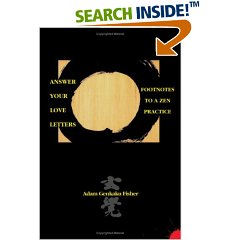Book Review by Fa Dao Shakya: Answer Your Love Letters: Footnotes To A Zen Practice by Adam Genkaku Fisher
 A wondrous little book has joined the unofficial canon of “American Zen.” And like most things wondrous and miraculous, it is a pebble that deserves to splash the pond like a boulder.
A wondrous little book has joined the unofficial canon of “American Zen.” And like most things wondrous and miraculous, it is a pebble that deserves to splash the pond like a boulder.
Answer Your Love Letters is a collection of essays, thoughts and letters by Adam Genkaku Fisher, an American Zen student in the Japanese lineage of Kyudo Nakagawa Roshi. He operates the Black Moon Zendo – a small zazen space which he built in the back yard of his home in Massachusetts. He is also one of the many little-known Dharma Teachers in the United States. A “man of no rank” content to be a Man of no rank, he has supported his own learning efforts, teaching efforts and family via occupation as a journalist at a small newspaper and the various jobs that would do that duty at any given time.
Answer Your Love Letters is very much “chop wood, carry water” zen. The essays and stories are taken from life. Unlike intellectualized zen, they are written as humble snapshots from life, often in the first person and with a journalist’s sparcity of words. The lessons in the stories shine through with the clarity of a single kanja brushed by a calligrapher’s hand. They are at once unassuming and ingenious.
Genkaku Fisher’s language and treatment are as fine or coarse as the need of a given piece dictates. His voice is as frank and earthy as a friend in the pub.
Speaking of his own moment of doubt at one point in his practice, he notes “The questions rolled off of my mind’s tongue one after another. They were cranky, they were filled with sadness, and sometimes they laughed with a nonosecond’s worth of clear light. And always the central question remained: “Is this bullshit or not?”
In an essay on Death, he notes eloquently “It is not a matter of sadness that things come and go. If it were a matter of sadness, the universe would be filled with nothing but a bunch of Sadsacks. But the universe is filled with joy and sorrow, laughter and tears, dancing and smiling, sunshine and rain. Moment after moment, birth and death, death and birth. Birthdeath. Deathbirth. None of it would be possible without you or me, but me and you are nothing but moment after moment.”
When Genkaku approaches teachings and sutras, his down-to-earth approach remains. They Are presented in a converstional tone rather than intellectualized explication. Like teachers (or students – same thing) discussing the matter on the couch in the living room. No argument about the refinements of Pali or Sanscrit translations, Japanese or Chinese iterations – just “here’s what it says and here’s how it works as I see it.”
In a world of would-be gurus and academic discourse, Answer Your Love Letters is a gem. The adventures of one man in samsara. An Everyman’s Guide to the Zen Experience written in Everyman’s language. He practices what he preaches in a couplet called Wisdom:
“Wisdom is what makes people happy.
Wise (wo)men are just fins on the car.”
Rev. Fa Dao Shakya is Director of the Zen Buddhist Order of Hsu Yun. He offers one-to-one Dharma instruction through the Ozark Zen Center.
